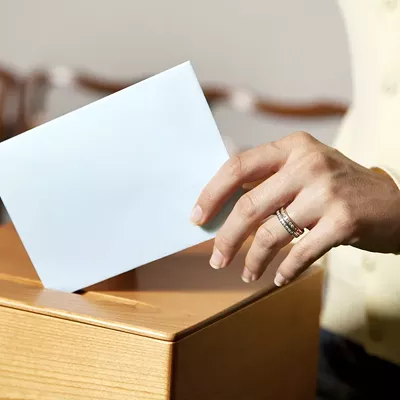Spokane just finished its primary elections. North Idaho’s were back in May. But Coeur d’Alene is still stuck in 2009 thanks to its city council election, a five-vote squeaker has created a frenzy of legal issues and cries of small-town corruption.
Last November, incumbent Councilman Mike Kennedy beat challenger Jim Brannon. A few weeks later, Brannon filed a lawsuit challenging the results. Idaho law allows the loser a free recount if the victory is within one-tenth of a percent — but using the same ballots and the same machines wouldn’t do, Brannon announced, demanding careful analysis of the election.

Jim Brannon lost his run for Coeur d'Alene City Council by five votes. Last year.
In the following months, that analysis has devolved into taunts and insults on competing websites (the Spokesman-Review’s Huckleberries Online and the conspiracy-minded opencda.com) and allegations that North Idaho’s civic leaders are as power hungry as North Korea’s dear leader.
How did a city council race ever come to this?
Early this year, Brannon’s attorney, Starr Kelso, hired a firm to find voters who registered using commercial instead of residential addresses or lived outside city limits — including some in Canada.
In June, Kelso and a handful of others analyzed absentee ballot envelopes from the election and found some 877 “anomalies,” according to an affidavit filed by Bill McCrory, one of the envelope-scourers. Some envelopes had mismatched signatures and names; others were missing date stamps. (Brannon and Kelso declined comment.)
Kootenai County Clerk Dan English says most of the anomalies are common mishaps: Some people think owning commercial property in city limits gives them voting rights, others move out of the country without forfeiting their citizenship and date stamps aren’t required if absentee ballots are hand-delivered to the elections office.
Worse, English says, is the effect Kelso’s use of a private firm and the posting of voters’ names, addresses and signatures could have on the democratic process.
“We’ve had people express concern to us that they may be reluctant to vote because just the fact that they voted in a certain election means they might be subject to a visit from a private investigator or [having] their signature published on the Internet,” he says. “We have a hard enough time getting people engaged in the elections process.”
Kennedy’s attorney, Scott Reed, has since argued that McCrory should be held contempt of court for defying a confidentiality agreement he signed when viewing the envelopes. Last week, Judge Charles Hosack, who is overseeing the proceedings, postponed the contempt trial until after the election challenge is decided.
McCrory and his attorney, Arthur Macomber, did not return requests for comment.
State law requires that election challenges be settled within 30 days of the election, but there seems to be no way of enforcing that, English says, so the squabble continues.
To Reed, the election suit is “purely political” and a “waste of time.” He estimates the dispute has cost the candidates, city and county around $20,000 per vote separating the candidates.
But his opponents — and the right-leaning army that has gathered behind Brannon — see it differently. Dan Gookin, another of the founders of opencda.com and former City Council candidate, considers himself a “government watchdog.” The 2009 election (in which he also ran and lost) was the product of incumbents looking to protect their power in Coeur d’Alene, he says.
“There’s no real telling whether this was just a massive screwup … or whether it was truly an organized effort to throw this election,” Gookin says. “You would think if it was a screwup, that the county could apologize and the city would demand to be paid back for a faulty election instead of people zipping their lips and acting strange.”
Reed says Brannon’s team has not been able to prove election fraud, so the case should be thrown out. If a judge disagrees with that notion next week, however, the case will go to trial Sept. 13. To reverse the results of the election, Kelso will have to prove that at least six of Kennedy’s votes were illegal.
Gookin says it may seem like unimportant small-town politics to most, but his camp is focused on the big picture.
“Our whole system is based on fair elections. If they’re not [fair], we’re just as bad as Cuba or North Korea,” he says. “What we’ve got to know is that our government in City Hall is legitimate, whether or not they are acting like it.”
English dismisses those allegations and says it boils down to outsiders not understanding the nuances of the process.
“Even just in the size of a Coeur d’Alene election, there are literally tens of thousands of interactions between people and the process. … Of course there’s always going to be some room for human error,” he says. “It’s still a process you can have confidence in.”





















